Francis Harrison Blackham was born in Toadmoor, Heage, Derbyshire, on 3rd October 1847, the son of Joseph and Ann (née Harrison) Blackham. Known later as Frank, he was baptised on 28th November at St Luke’s Church, Heage.
Frank grew up at Toadmoor, then part of Heage. His father Joseph was a nailmaker and the 1851 census shows that Frank’s older brothers Joseph and John, then aged 13 and 11, had left school and were also working as nailmakers.
Toadmoor, or ‘The Old Moor’, is probably derived from the local dialect ‘ter-owd’ used for ‘the old’, i.e. Ter Owd Moor. The area also began to be known as Ambergate from 1837, with the Midland Railway naming the local station ‘Amber Gate’ when it opened in 1840.
By 1861 and aged 13, Frank was working with his father as a nailmaker at Toadmoor. However, between 1861 and 1871, Frank and his older brother John moved to Chesterfield. In April 1871, they were lodging in a cottage at Locoford Farm and working for the railway, with Frank being employed as a porter. Despite their eight year age gap, it appears that Frank and John were close to each other: John would later leave property to Frank in his Will.
It is not known how or where Frank met his future wife - perhaps during the next five years Frank moved to the Alfreton area with the railway, or to work with his father at Toadmoor. However, banns of marriage were read at Christ Church, Cotmanhay, on Sunday 24th September, 1st and 8th October 1876 between ‘Francis Blackham of the Parish of Heage and Ellen Briggs of this Parish’. They were married at Cotmanhay on 17th October and their marriage was witnessed by Ellen’s younger sisters Harriet and Clara.
Ellen Briggs was born in March 1857 at Snow Hill, Birmingham, the daughter of John Briggs, a policeman with the Birmingham Borough Police, and Hannah, a school mistress. John Briggs joined the newly formed Derbyshire Constabulary in November 1858 and the family were living at Middleton-by-Wirksworth, where Ellen was baptised on 13th March 1859. By April 1861 the family had moved to Brassington, then to Spondon, and by 1863 they were living at Skipton, Yorkshire, Ellen’s father having left the police force.
By 1867 Ellen had moved with her family again, this time to Cheltenham, where in April 1871 she was employed as a servant. By 1874 the family had moved back to Derbyshire, living at the Gas Works in Alfreton where John Briggs worked as a gas manager. In November 1874 Ellen had a son who she named John William Briggs. Finally the family moved to Shipley and Ellen had a second son, born in Shipley Wharf, on 17th September 1876, one month before she married Frank. However, he was named George Blackham and his birth was registered by Ellen’s mother four days after her marriage to Frank. Georges’ birth certificate records his father as ‘Francis Blackham’ and his mother as ‘Ellen Briggs now the wife of Frances Blackham’.
Frank and Ellen’s marriage record states that Frank, aged 28, was a butcher of Ambergate, which is the same occupation recorded on his son George’s birth certificate. These are the only two places that this is shown as Frank’s occupation. Curiously the occupation of Frank’s father was noted as a farmer but he was actually a nail maker. Given that Ellen had two children at the time of her marriage, the occupations of Frank and his father may have been mistated to disguise who they actually were.

After their marriage, Frank and Ellen lived in Toadmoor, with Frank working as a nailer. Their son Frank was born in Toadmoor in September 1878 and baptised on 12th January 1879 at Heage. Their next son, Joseph Henry, was born in October 1879, also at Toadmoor, but died in July 1880 aged 9 months. Frank and Ellen’s next son, Albert Edward, was born towards the end of 1881 but died from bronchitis and/or pneumonia on 7 June 1884 aged 2.
Frank’s father Joseph died in April 1880 aged 78. In his Will he bequeathed three houses to Frank’s mother Ann, and two houses to Frank’s brother John. He directed that on Ann’s death the three houses were also to go to John. His Will bequeathed ‘to my son Francis Blackham the sum of two pounds ten shillings annually, the first payment to fall due in eleven years after my decease, this is in consideration that my son John shall not require the payment of any sum of money now owing by my son Francis to him’. A similar bequest was made to Frank’s brother William. However, when Frank’s bachelor brother John died in 1904 his Will bequeathed to Frank ‘all those four cottages and gardens situated in Toadmoor...together with the house in Toadmoor Hill’. John also bequeathed a house and five cottages to the wife of his brother William. On the death of Frank, and William’s wife, the houses and cottages were to be sold and the proceeds shared equally between John’s nephews and nieces.
Highway Robbery
At 6:30 p.m. on 5th August 1880, Ellen left home and caught a train from Ambergate Station to Belper. She decided to walk back, leaving the market place around 8.30 p.m., along Swinney Lane, to join the turnpike road (now the A6), which passes through Dunge Wood. ‘When she got half way through the wood, which was on the side of the road, she noticed that a man passed her on the footpath. He said “Good night,” and she answered “Good night,” and passed on. When she had gone twenty or thirty yards she heard a noise come from the side of the wood—a noise as if someone had jumped off a wall on the ground. There was a wall by the wood. The noise came from behind her, and in about a minute someone said, “Missus.” She turned round and saw two men close behind her. The taller of the two said, “Will you give us a penny”. 1 Ellen replied that ‘she did not think she had got one left, and felt in her pockets to find one. While doing so the taller man said “You have more than a penny, and we are going to have it.” He then laid hold of her by putting his left arm round her back, and held her. He said “If you shout I will kill you.” The man had a rough stick, with a large knob, in his hand. He added “There are two of us; we will kill you, but if you make no noise we will not hurt you.” The man held the stick in his hand in front of her in a menacing manner. The other man put his hand in her pocket, took her purse out, emptied it, and put it in again. There was 6s. 10d. in the purse.’ 1 On returning home, Ellen told her friends and informed the police of what had happened, providing them with a description of the men.
At around midnight on the same day, Police-sergeant Musgrove went to a lodging-house at Belper and questioned three men. When asked where he had been that day, one man, Hill, ‘said he had been with Bradford Bill, the hatter, at Heage, drinking...the hatter...was too drunk to remember where he had been. O’Brien said he had only come from Derby that day’. 1 The three men were apprehended and taken to the lock-up at Belper.
The following morning, Ellen went to Belper Police Station and in the yard she was shown three men. ‘Mrs. Blackham at once picked out O’Brien as the man who took her money. She thought Hill was one, but she would know if she heard his voice. Prisoners were taken to the clerk’s office, where the magistrates attended, and while waiting the superintendent asked Hill where he came from, and Hill made a reply, and Mrs. Blackham, recognising his voice, said, “That is the man.”...O’Brien had threepence when searched.’ 1 At the Belper Petty Sessions on 26th August, James O’Brien and George Hill ‘two tramps, were charged with making an assault upon Ellen Blackham’ 2 and were committed for trial at the next assizes.
The trial of James O’Brien, a dealer aged 24, and George Hill, a labourer, aged 34, was held at Derby on 5th November. The prisoners defended themselves, and there was some exchange between them and Ellen, as a witness, when she said that she felt sure that the two men in the dock were the two men who stopped and robbed her:
—‘(Hill: “Look us straight in the face and say so.)”
—[Ellen] ‘recognised the voice of the taller one.
—‘Cross-examined by Hill: Did you not shake your head and say I was not the man?
—‘Witness: I said the hatter was not the man.
—‘Hill: Did you not say when you came to the Workhouse that you “thought” we were the men?
—‘Witness: I said you were the men.
—‘Hill: The hatter is a friend of mine.
—‘Cross-examined by O’Brien:
—[Ellen] ‘I said the hatter was not the man. Before the magistrates I said you were the man, and always said so. Don’t [you] remember the magistrates saying, “You must not think; you must be sure.”’ 1
Other witnesses were called, one of which said he saw Hill and O’Brien together, without the hatter, at about 6 p.m. at Heage on 5th August: ‘Heage was two miles from Belper, and Dunge Wood about a mile and a half distant.’ 1
‘The jury found the prisoners guilty, and in passing sentence the judge said the prisoners were guilty of an offence which at one time was punishable with death...Each of the prisoners was sentenced to 18 month’s imprisonment with hard labour’.3
Crich Carr
The family were still in Heage at the time of the 1881 census, when Frank was working as a horse nail maker. However, by 1884 they had moved to Thurlow Booth, near Crich Carr, where their first daughter Hannah Rebecca was born in February 1884. Her birth certificate records that at this time Frank was a labourer.
Frank and Ellen’s next three children were all born in Thurlow Booth; Clara Ellen born in April 1886, Ernest born in May 1887, and Mary Alice born in July 1889 and baptised at St Mary’s Church, Crich, on 15th November.
While living at Thurlow Booth, the children attended Crich Carr Primary School. Hannah attended from 4th June 1888 when she was 3 years old, Frank from 15th October 1888 when he was 10 years old (leaving on 10th November 1890), Clara from 7th January 1890 when she was almost 5 years old, and Ernest from 3rd July 1890 when he was 3 years old. The records show that the family lived at Hollow Booth and their father Frank was a mason.
In April 1891, at the time of the national census, Frank was still working as a mason. Family history recalls that he was involved with the building of St Anne’s Church at Ambergate, which was constructed by Joseph Glossop, a local builder, in 1891 and 1892. The church opened on 13th February 1892.
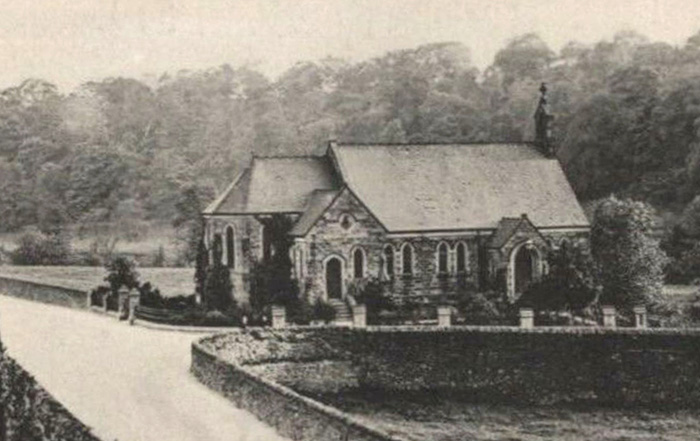 St Anne’s Church, Ambergate
St Anne’s Church, Ambergate
Back to Toadmoor
On 14th October 1891, Hannah, Clara and Ernest all left Crich Carr School. The family moved back to the hamlet of Toadmoor. Here Frank and Ellen’s daughter Annie was born on 6th July 1892, who was followed by Edith in September 1894, and Lucy in December 1895. However, Lucy died on 20th April 1897 from whooping cough and bronchitis and was buried in the churchyard of St Luke’s Church, Heage, on 23rd April.
At some point the family moved to a terraced cottage, being one of four which were owned by Frank’s brother John. The cottages were built circa 1897. Frank and Ellen’s son Arthur was born in May 1898 at Toadmoor. He was baptised at Heage on 25th May. Arthur would be Ellen’s thirteenth and last child.
Ellen’s mother Hannah died in September 1901 and administration for her effects of £26 14s. 11d. was granted to Ellen.
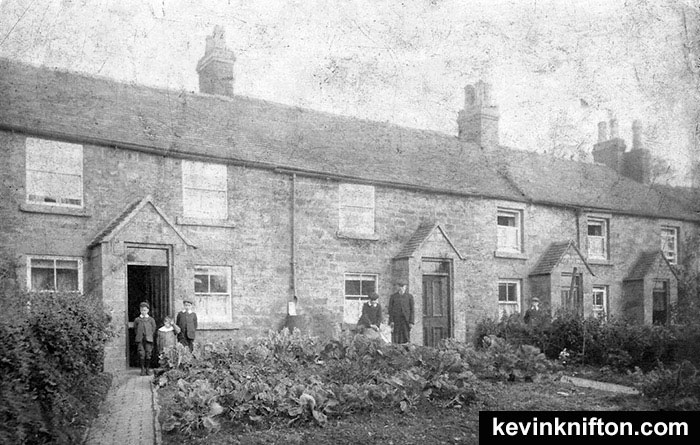 Frank and Ellen’s home (centre), in the row of cottages on Toadmoor Lane, circa 1915
Frank and Ellen’s home (centre), in the row of cottages on Toadmoor Lane, circa 1915
Frank’s brother John died in April 1904 and as well as the bequest of the property mentioned above, his Will directed that ‘my brother Francis Blackham shall pay fifty shillings per annum to my Brother William Blackham for as long as my Brother William lives. Should my Brother Francis predecease my Brother William the said Executor shall pay one hundred pounds into the bank and every year they shall pay the interest to my Brother William’. William outlived Francis by eight years.
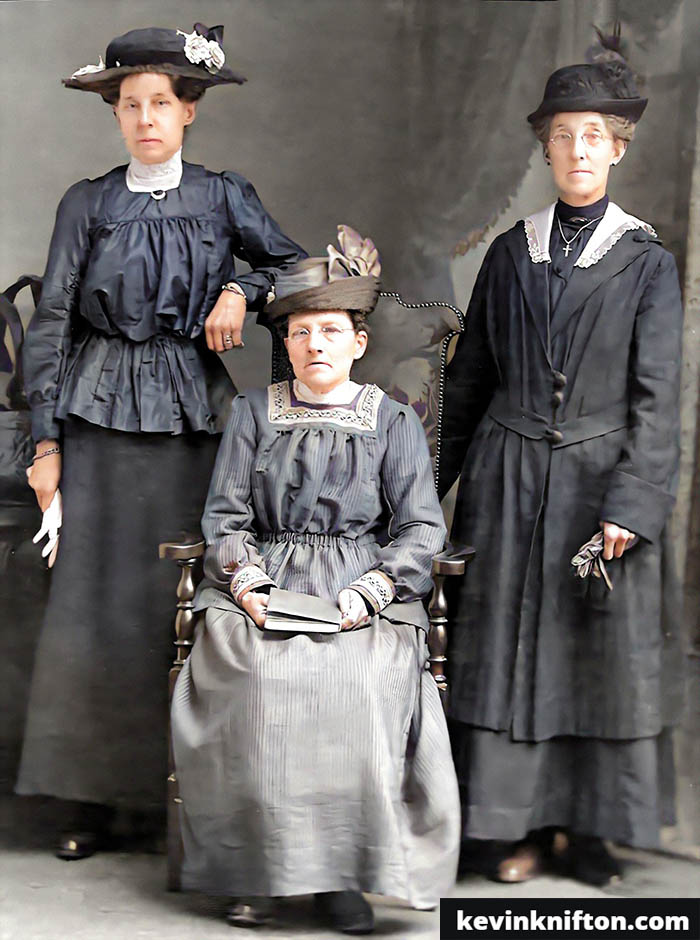 Ellen Blackham (seated) with her sisters circa 1915
Ellen Blackham (seated) with her sisters circa 1915
Frank was still employed as a stone mason in 1911, living at Toadmoor. At some point he went to work at Johnson and Nephew Wireworks at Ambergate.
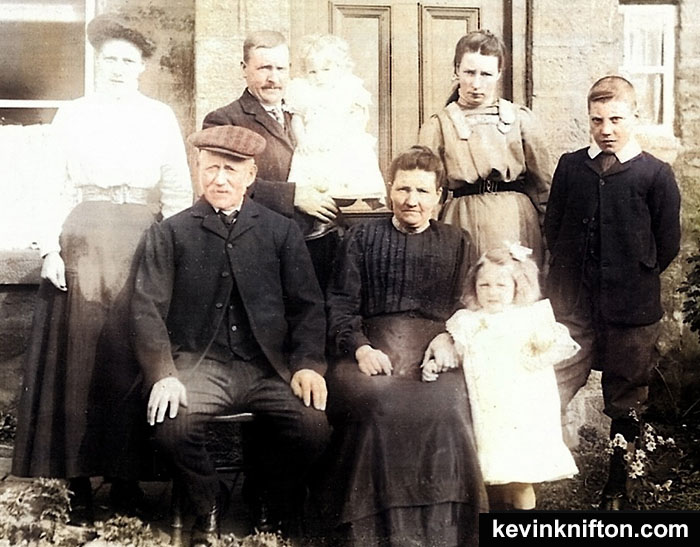 Frank and Ellen Blackham with Mary Ann Briggs, John William Briggs, William Briggs, Annie Blackham, Arthur Blackham, and child (unknown), circa 1915
Frank and Ellen Blackham with Mary Ann Briggs, John William Briggs, William Briggs, Annie Blackham, Arthur Blackham, and child (unknown), circa 1915
Between 1911 and 1917, Frank and Ellen moved to Hill View on Newbridge Road where, on 19th December 1918, Frank died at the age of 71. He was buried in the churchyard at Heage.
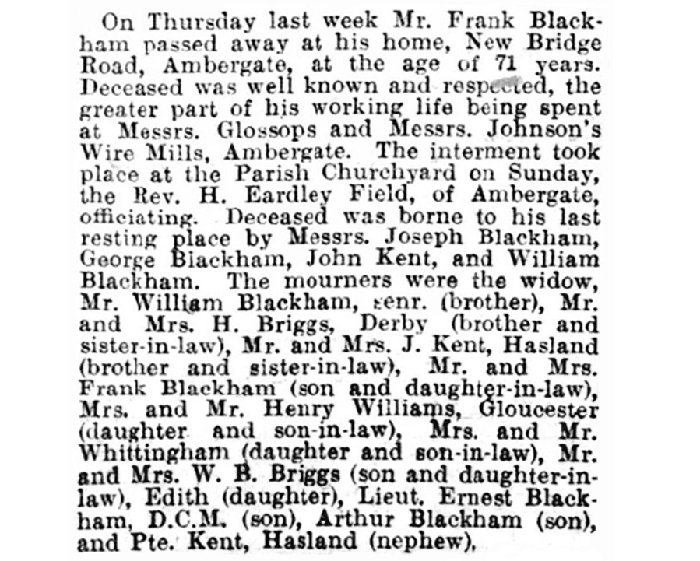
After her husband’s death, Ellen lived with her daughter Annie Whittingham, helping her with the housework and children. Her daughter Hannah Williams moved back to Ambergate in the late 1920’s and initially lived with her family in the house next door to Ellen, Annie, and her children. When Hannah and Henry Williams moved to a new house called Rosehill in 1931, Ellen moved in with them.
Ellen worked as a housekeeper for a Belper business man, and was a member of Belper Conservative Association, taking a keen interest in social work. She attended the Bethel United Methodist Church on Devonshire Street, a short walk from Rosehill. Ellen is known to have enjoyed humbugs which she used to suck while sitting in her rocking chair.
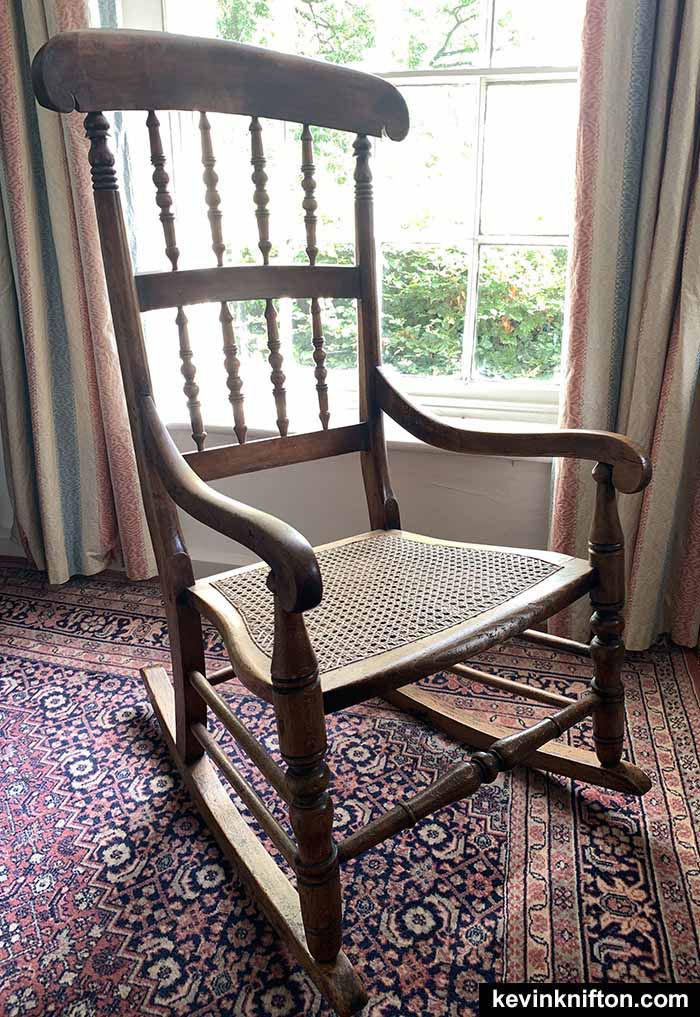 Ellen Blackham’s rocking chair
Ellen Blackham’s rocking chair
Ellen Blackham died on 11th April 1935 at Rosehill, Devonshire Street, Ambergate, aged 78. Her funeral service was held in the afternoon of 14th April at the Methodist Church on Devonshire Street, Ambergate, and she was buried with her husband in the churchyard at Heage. There is no headstone to mark where they were buried.
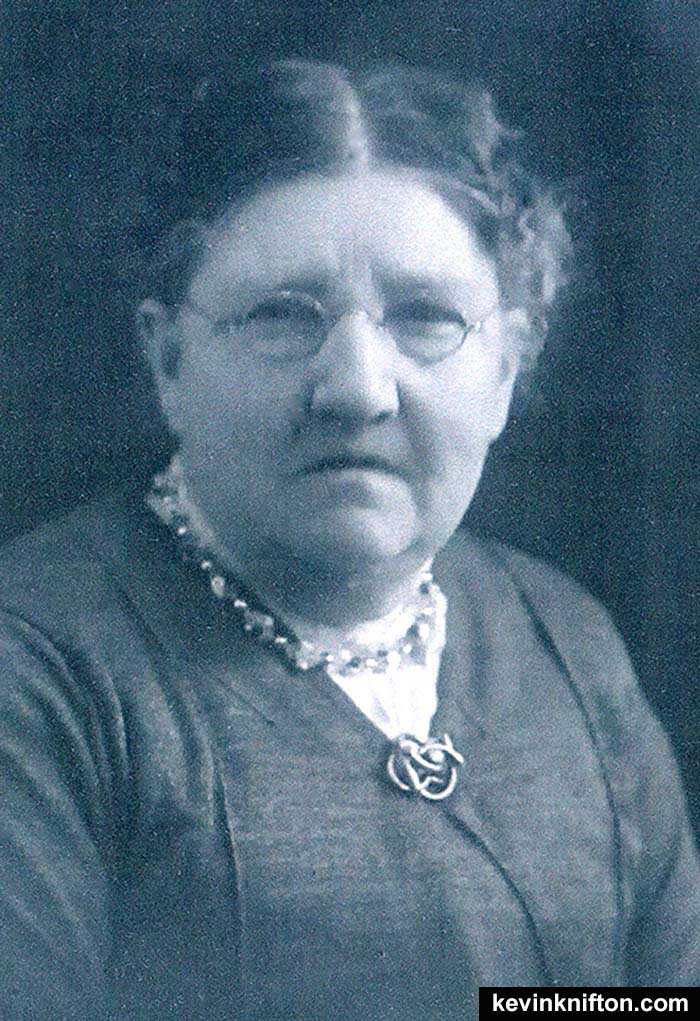 Ellen Blackham circa 1934
Ellen Blackham circa 1934
Francis Harrison and Ellen Blackham were my great-great-grandparents.
1 Derby Mercury, 9th November 1880
2 Alfreton Journal, 27th August 1880
3 Derby Daily Telegraph, 6th November 1880